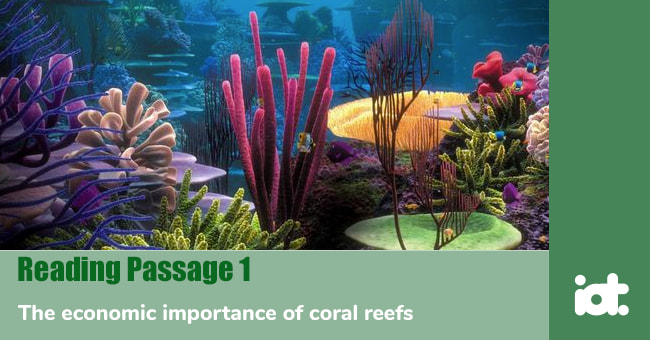
IELTS Practice Tests Plus Volume 3
- 发布时间: 14 Dec 2017
- 模考人次: 450,032
正确答案:
Part 1: Question 1 - 13
- 1 FALSE
- 2 TRUE
- 3 TRUE
- 4 TRUE
- 5 NOT GIVEN
- 6 FALSE
- 7 FALSE
- 8 sea cucumbers
- 9 agricultural
- 10 scuba diving
- 11 communications
- 12 sustainability
- 13 conflict
- 1 FALSE
- 2 TRUE
- 3 TRUE
- 4 TRUE
- 5 NOT GIVEN
- 6 FALSE
- 7 FALSE
- 8 sea cucumbers
- 9 agricultural
- 10 scuba diving
- 11 communications
- 12 sustainability
- 13 conflict
Part 2: Question 14 - 26
- 14 v
- 15 ii
- 16 vi
- 17 i
- 18 iv
- 19 viii
- 20 21 B,D
- 22 23 A,E
- 24 discovery learning
- 25 teacher
- 26 peers
- 14 v
- 15 ii
- 16 vi
- 17 i
- 18 iv
- 19 viii
- 20 21 B,D
- 22 23 A,E
- 24 discovery learning
- 25 teacher
- 26 peers
Part 3: Question 27 - 40
- 27 C
- 28 D
- 29 A
- 30 YES
- 31 YES
- 32 NO
- 33 NOT GIVEN
- 34 YES
- 35 C
- 36 A
- 37 F
- 38 D
- 39 E
- 40 A
- 27 C
- 28 D
- 29 A
- 30 YES
- 31 YES
- 32 NO
- 33 NOT GIVEN
- 34 YES
- 35 C
- 36 A
- 37 F
- 38 D
- 39 E
- 40 A
详细试卷答案解析:
Questions 1-7
Do the following statements agree with the information given in Reading Passage 1?
Write
| TRUE | if the statement agrees with the information |
| FALSE | if the statement contradicts the information |
| NOT GIVEN | If there is no information on this |
1 In most places, coral-reef gleaning is normally carried out by men.
2 Involvement in coral-reef-based occupations raises the status of women.
3 Coral reefs provide valuable learning opportunities for young children.
4 The women of Ulithi Atoll have some control over how fish catches are shared out.
5 Boats for use by the inhabitants of Ulithi are constructed on Yap Island.
6 In coral reef fisheries, only male traders can apply for finance.
7 Coral reefs provide a less constant source of income than near-shore seas.
- 1 Answer: FALSE
Keywords in Questions
Similar words in Passage
Q1: In most places, coral-reef gleaning is normally carried out by men.
in a coral-reef fishery the physical accessibility of the reef opens up opportunities for direct participation by women
Note:
After skimming, you can realize that this statement is related to the 2nd paragraph. In the quoted sentences, it is clear that the accessibility of the reef is carried out by women, not men. For that reason, the answer is FALSE.
- 2 Answer: TRUE
Keywords in Questions
Similar words in Passage
Q2: Involvement in coral-reef-based occupations raises the status of women.
consequently increases their independence and the importance of their role in the community
Note:
Following the flow of information in Q1, you can easily find out the needed information for Q2. It is said that coral-reef-based occupations increase women’s independence and the importance of their role. Thus, we can figure out that these occupations raise the status of women. And then, TRUE is the answer.
- 3 Answer: TRUE
Keywords in Questions
Similar words in Passage
Q3: Coral reefs provide valuable learning opportunities for young children.
It also provides a place for children to play, and to acquire important skills and knowledge for later in life
Note
Continuing to scan the 2nd paragraph, you can find out phrases related to this statement. Based on keyword ‘children’, it is apparent in the needed information that coral reefs provide a place for children to acquire important skills and knowledge. In other words, it provides valuable learning opportunities for children. Hence, there is no doubt that the answer is TRUE.
- 4 Answer: TRUE
Keywords in Questions
Similar words in Passage
Q4: The women of Ulithi Atoll have some control over how fish catches are shared out.
On Ulithi Atoll in the western Pacific, women have a distinct role and rights in the distribution of fish catches
Note
Based on the keyword ‘Ulithi Atoll’, we can locate the needed information in paragraph 3. According to it, women have a distinct role and rights in the distribution of fish catches. In other words, they have some control over the distribution of fish catches. This kind of figuration will be much viable if you can recognize synonyms of keywords. Therefore, TRUE is the answer.
- 5 Answer: NOT GIVEN
Keywords in Questions
Similar words in Passage
Q5: Boats for use by the inhabitants of Ulithi are constructed on Yap Island.
This is because the canoes, made from mahogany logs from nearby Yap Island , are obtained through the exchange of cloth made by the women of Ulithi
Note:
Along with the flow of information related to Ulithi, you can find out evidence for Q5. In order to be compatible with the statement, the above sentence can be rewritten that canoes for the use by the inhabitants of Ulithi which are obtained through the exchange of cloth are made from mahogany logs from nearby Yap island. Accordingly, it is obviously that there is no evidence supporting the idea that boats or canoes are constructed on Yap Island, but it is just made from mahogany logs from nearby Yap Island. Thus, the information in the statement is NOT GIVEN.
- 6 Answer: FALSE
Keywords in Questions
Similar words in Passage
Q6: In coral reef fisheries, only male traders can apply for finance.
Small-scale reef fisheries support the involvement of local women traders and their involvement can give them greater control over the household income, and in negotiating for loans or credit
Note
After scanning paragraph 3, you can also realize needed information for this question based on the keyword ‘reef fisheries’. According to that, reef fisheries support the involvement of local women traders, not just men traders. From that point, we can figure out that the statement is FALSE.
- 7 Answer: FALSE
Keywords in Questions
Similar words in Passage
Q7: Coral reefs provide a less constant source of income than near-shore seas.
The diversity of coral reef fisheries, combined with their physical accessibility and the protection they provide against bad weather, make them relatively stable compared with other fisheries, or land-based agricultural production
Note:
After scanning, you can notice information related to keywords ‘less constant’ and ‘near-shore seas’. It is said in the paragraph that the diversity, physical accessibility and protection of coral reef fisheries make them relatively stable compared with other fisheries. From that point, we can figure out that they provide a constant source of income than other fisheries or near-shore seas. Therefore, FALSE is the answer.
Questions 8-13
Complete the notes below.
Choose NO MORE THAN TWO WORDS from the passage for each answer.
How coral-reef-based resources protect people during difficult times
Coral reefs can provide
- a resource bank, e.g. for keeping clams and 8
- a seasonal back-up, when 9 products are insufficient
e.g. in northern Mozambique.
- a tourist attraction, e.g. 10 tours in the Caribbean.
Benefits for local people include:
- The creation of jobs.
- Improvements to roads and 11
Important considerations:
- Development must be based on appropriate principles.
- Need for 12
Poorly-planned development can create 13 with local fishers.
- 8 Answer: sea cucumbers
Tips for Q8 – Q12:
With this kind of task, you are highly recommended to locate paragraphs in the passage where there are many similar words to keywords in the task. Your remaining duty is just finding out the suitable words to fill in the gap.
As a result, the needed information is in 4 last paragraphs.
Keywords in Questions
Similar words in Passage
Q8: Coral reefs can provide
a resource bank, e.g. for keeping clams and _________
the reef may even act as a resource bank… In Manus, Papua New Guinea, giant clams are collected and held in walled enclosures on the reef, until they are needed during periods of rough weather. In Palau, sea cucumbers are seldom eaten during good weather in an effort to conserve their populations for months during which rough weather prohibits good fishing.
Note
In 5th paragraph, we can find out needed information based on keyword ‘a resource bank’. Accordingly, the writers gave examples to illustrate the idea the reef may act as a resource bank. The first example which is from Manus, Papua New Guinea indicated the storage of giant clams for periods of rough weather. The remaining example, undoubtedly, is the conservation of sea cucumbers for months during which rough weather prohibits good fishing. From that point, we can figure out that the blank should be filled with ‘sea cucumbers’.
- 9 Answer: agricultural
Keywords in Questions
Similar words in Passage
Q9:
a seasonal back-up, when ________ products are insufficient, e.g. in northern Mozambique.
For example, in coastal communities in northern Mozambique, reef harvests provide key sources of food and cash when agricultural production is low, with the peak in fisheries production coinciding with the period of lowest agricultural stocks.
Note
Continuing to study what coral reef can provide, we should follow the information along with Q9. Based on the keyword ‘northern Mozambique’, we can recognize the information stated that reef harvests provide key source of food and cash when agricultural production is low or insufficient. Therefore, we figure out that the blank should be filled with ‘agricultural’.
- 10 Answer: scuba diving
Keywords in Questions
Similar words in Passage
Q10: a tourist attraction, e.g. ________ tours in the Caribbean.
In the Caribbean alone, tours based on scuba-diving have attracted 20 million people in one year
Note
Based on the keyword ‘Caribbean’, we can find out the needed information in paragraph 7. As an example, accordingly, tours based on scuba-diving in the Caribbean have attracted 20 million people in one year. Hence, suitable words for the blank must be ‘scuba-diving’ (a adjective).
- 11 Answer: communications
Keywords in Questions
Similar words in Passage
Q11: Benefits for local people include:
The creation of jobs.
Improvements to roads and ______
The upgrading of roads and communications associated with the expansion of tourism may also bring benefits to local communities
Note
We can easily find out the benefits for local people in paragraph 7. Following improvements to roads, accordingly, another benefit associated with the expansion of tourism is communications. Thus, ‘communications’ fits the blank well.
- 12 Answer: sustainability
Keywords in Questions
Similar words in Passage
Q12: Important considerations:
Development must be based on appropriate principles.
Need for ________
There is growing recognition that sustainability is a key requirement, as encompassed in small-scale eco-tourism activities, for instance.
Note
Based on the first important considerations, we can locate the second one following the flow of information in paragraph 7. It is said that there is growing recognition that sustainability is a key requirement. From that point, the second consideration must be the need for sustainability. Therefore, the answer is ‘sustainability’.
- 13 Answer: conflict
Keywords in Questions
Similar words in Passage
Q13: Poorly-planned development can create _______ with local fishers.
Where tourism development has not been carefully planned, and the needs and priorities of the local community have not been properly recognised, conflict has sometimes arisen between tourism and local, small-scale fishers.
Note
The blank needs a noun.
We can easily find out the needed information in the last paragraph. According to that, because tourist development has not been carefully planned, conflict has sometimes arisen between tourism and local fishers. Hence, we can conclude that poorly-planned development can create conflict with local fishers.
READING PASSAGE 1
You should spend about 20 minutes on Questions 1-13, which are based on Reading Passage 1 below.

The economic importance of coral reefs
A lot of people around the world are dependent, or partly dependent, on coral reefs for their livelihoods. They often live adjacent to the reef, and their livelihood revolves around the direct extraction, processing and sale of reef resources such as shell fish and seaweeds. In addition, their homes are sheltered by the reef from wave action.
Reef flats and shallow reef lagoons are accessible on foot, without the need for a boat, and so allow women, children and the elderly to engage directly in manual harvesting, or ‘reef-gleaning’. This is a significant factor distinguishing reef-based fisheries from near-shore sea fisheries. Near-shore fisheries are typically the domain of adult males, in particular where they involve the use of boats, with women and children restricted mainly to shore-based activities. However, in a coral-reef fishery the physical accessibility of the reef opens up opportunities for direct participation by women, and consequently increases their independence and the importance of their role in the community. It also provides a place for children to play, and to acquire important skills and knowledge for later in life. For example, in the South West Island of Tobi, in the Pacific Ocean, young boys use simple hand lines with a loop and bait at the end to develop the art of fishing on the reef. Similarly, in the Surin Islands of Thailand, young Moken boys spend much of their time playing, swimming and diving in shallow reef lagoons, and in doing so build crucial skills for their future daily subsistence.
Secondary occupations, such as fish processing and marketing activities, are often dominated by women, and offer an important survival strategy for households with access to few other physical assets (such as boats and gear), for elderly women, widows, or the wives of infirm men. On Ulithi Atoll in the western Pacific, women have a distinct role and rights in the distribution of fish catches. This is because the canoes, made from mahogany logs from nearby Yap Island, are obtained through the exchange of cloth made by the women of Ulithi. Small-scale reef fisheries support the involvement of local women traders and their involvement can give them greater control over the household income, and in negotiating for loans or credit. Thus their role is not only important in providing income for their families, it also underpins the economy of the local village.
Poor people with little access to land, labour and financial resources are particularly reliant on exploiting natural resources, and consequently they are vulnerable to seasonal changes in availability of those resources. The diversity of coral reef fisheries, combined with their physical accessibility and the protection they provide against bad weather, make them relatively stable compared with other fisheries, or land-based agricultural production.
In many places, the reef may even act as a resource bank, used as a means of saving food for future times of need. In Manus, Papua New Guinea, giant clams are collected and held in walled enclosures on the reef, until they are needed during periods of rough weather. In Palau,sea cucumbers are seldom eaten during good weather in an effort to conserve their populations for months during which rough weather prohibits good fishing.
Coral reef resources also act as a buffer against seasonal lows in other sectors, particularly agriculture. For example, in coastal communities in northern Mozambique, reef harvests provide key sources of food and cash when agricultural production is low, with the peak in fisheries production coinciding with the period of lowest agricultural stocks. In Papua New Guinea, while agriculture is the primary means of food production, a large proportion of the coastal population engage in sporadic subsistence fishing.
In many coral-reef areas, tourism is one of the main industries bringing employment, and in many cases is promoted to provide alternatives to fisheries-based livelihoods, and to ensure that local reef resources are conserved. In the Caribbean alone, tours based on scuba-diving have attracted 20 million people in one year. The upgrading of roads and communications associated with the expansion of tourism may also bring benefits to local communities. However, plans for development must be considered carefully. The ability of the poorer members of the community to access the benefits of tourism is far from guaranteed, and requires development guided by social, cultural and environmental principles. There is growing recognition that sustainability is a key requirement, as encompassed in small-scale eco-tourism activities, for instance.
Where tourism development has not been carefully planned, and the needs and priorities of the local community have not been properly recognised, conflict has sometimes arisen between tourism and local, small-scale fishers.









